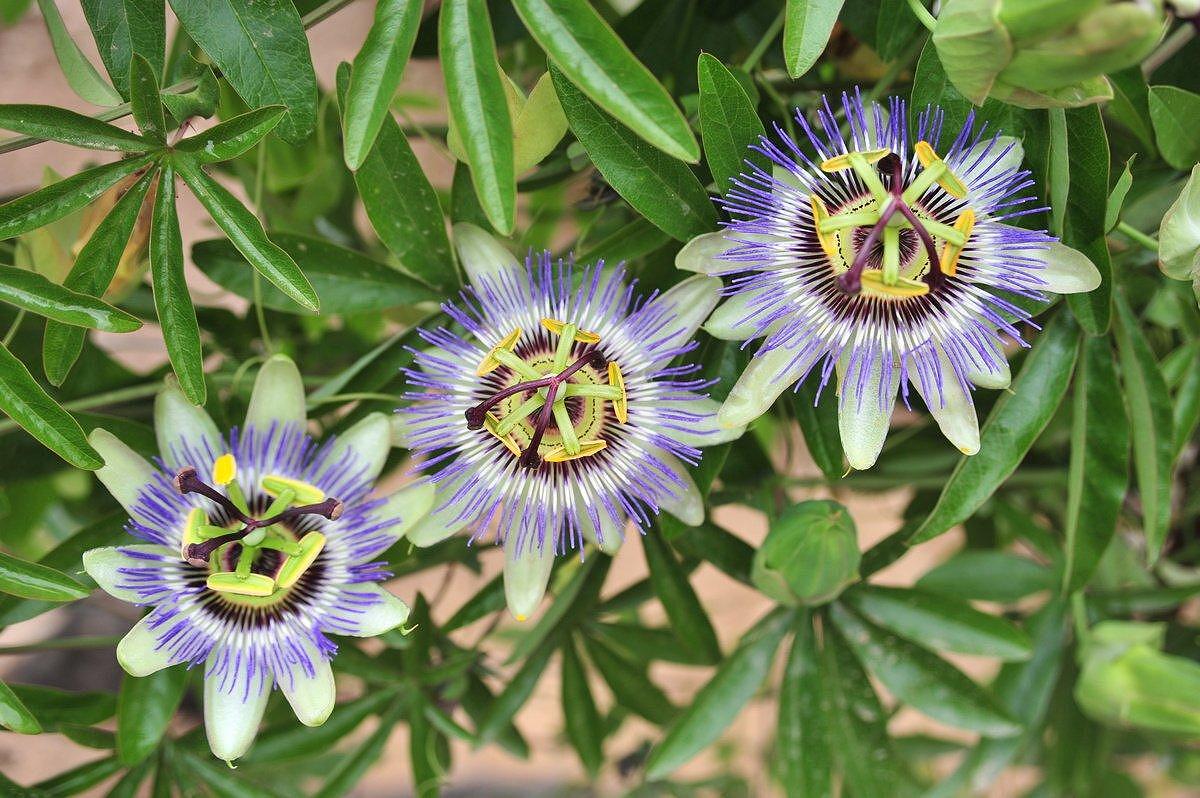Passionflower, scientifically known as Passiflora, is a genus of plants that includes over 500 different species distributed mainly in tropical and subtropical regions around the world. This genus includes species such as Passiflora incarnata, Passiflora edulis and many others.
Passiflora is an herb with diverse beneficial properties for human health and well-being. One of the most well-known properties of passionflower is its ability to reduce stress and anxiety. Various species of passionflower contain bioactive compounds such as alkaloids, flavonoids, and coumarins that help the body cope with stressful conditions. This herb is traditionally used as a sedative and is believed to aid in easy falling asleep and depth of sleep.
Additionally, passionflower may have a positive effect on the cardiovascular system. Some studies have found that it can help reduce blood pressure and improve heart function.
Passionflower contains antioxidants that help the body fight free radicals and maintain cell health. These antioxidants have a beneficial effect on the skin and protect it from premature aging. The herb is also known for its antispasmodic properties, which can be helpful in relieving certain types of cramps and pains – especially those associated with the smooth muscles of the body.
History of the herb passionflower
Many cultures around the world have used passionflower as a folk remedy. Herbalists in South America have known it for millennia.A Spanish doctor named Monardes only discovered it in 1569 for the western world. In 1633, Jesuit Ferrari published a book entitled De Florum Cultura, where he described the passionflower plant and its various parts as a symbolic representation of the Passion of Christ. The Jesuits gave the passionflower its Latin names: passio, meaning suffering, flos, meaning flower, and incarnata, which translates as “create flesh” or rebirth. This is how the name Passiflora incarnata came about.
Passiflora was used in American homeopathy as a sedative during World War I, and Brazilian folk medicine applied it as a remedy for boils and wounds. In Europe, the herb is mostly used for conditions of anxiety and depression.
5 health benefits of taking passionflower
- Relieve anxiety
Passionflower is effective in relieving anxiety and stress. The herbal extract is also beneficial for generalized anxiety disorder (GAD). This herb has been used for thousands of years in traditional medicine as a calming agent for various levels of anxiety. Moreover, passionflower may be preferred over some pharmaceutical preparations as it rarely causes adverse effects and does not impair performance. So, the use of passionflower for anxiety relief is well supported and proven over time.
Passionflower contains various active compounds that are associated with its calming properties. The most important of these include:
- Flavonoids: These natural antioxidants are the main group of active compounds in passionflower. The flavonoids have a calming and relaxing effect on the nervous system. The particular flavonoid found in passionflower is part of the flavone group.
- Alkaloids: Passionflower contains alkaloids such as harmine, which can also have a beneficial effect on the nervous system. These alkaloids can help relaxation and reduce tension.
- Glycosides. They contribute to longer and more restful sleep.
- These compounds interact with corresponding receptors in the brain and nervous system, allowing them to have a calming effect on the body.
- Helps sleep
Passionflower is a natural sleep aid. This plant extract with calming properties can help people relax and fall asleep more easily. The compounds it contains can reduce stress and tension, which often interfere with good sleep. The herb has the ability to increase gamma-aminobutyric acid (GABA) in the brain. GABA can help improve sleep quality as it reduces brain activity. Passionflower is a safe alternative for people seeking support for better and more restful sleep without using sleep aids.
- Helps children with attention deficit hyperactivity disorder
Passionflower is a plant that is used in alternative and traditional medicine as a natural method to manage symptoms in children with Attention Deficit Hyperactivity Disorder (ADHD). It contains flavonoids and alkaloids that can calm the nervous system. The herb alleviates the condition of children with ADHD who often struggle with difficulty concentrating and excessive activity. Passionflower is also known for its ability to lower stress and anxiety. This is especially helpful for children with ADHD who often experience anxiety and stress due to the challenges associated with the demands placed on them at school. It is important to note that the use of passionflower as an adjunctive method of ADHD management should be consulted with a physician or specialist, especially in children.
- Improves gastrointestinal health
Passionflower has positive effects on gastrointestinal health. This plant extract contains a number of biologically active compounds that may be beneficial for digestion and gastrointestinal function.
One of the key properties of passionflower is its ability to relax the musculature and nervous system. This process a has a positive impact on digestion as it helps the stomach and intestines work more efficiently. This can be particularly helpful for problems such as irritable bowel syndrome (IBS). Additionally, the herb can help with managing stress and anxiety, which are often associated with gastrointestinal problems. Chronic stress can contribute to changes in digestion. The use of passionflower may help reduce stress and therefore improve gastrointestinal health.
- Has anticonvulsant effects
Passionflower’s anticonvulsant effects are related to its content of active compounds, such as flavonoids and alkaloids. These ingredients positively affect the nervous system and reduce the risk of epileptic seizures. Studies have shown that regular intake of passionflower can help people suffering from epilepsy or other forms of convulsions to control their condition and reduce the frequency and severity of seizures.
This natural approach to managing convulsions makes passionflower an attractive alternative or complement to standard drug therapies.
Sources:
- Movafegh A, Alizadeh R, Hajimohamadi F, Esfehani F, Nejatfar M. Preoperative oral Passiflora incarnata reduces anxiety in ambulatory surgery patients: a double-blind, placebo-controlled study. Anesth Analg. 2008;106(6):1728-1732. doi:10.1213/ane.0b013e318172c3f9
- Akhondzadeh S, Naghavi HR, Vazirian M, Shayeganpour A, Rashidi H, Khani M. Passionflower in the treatment of generalized anxiety: a pilot double-blind randomized controlled trial with oxazepam. J Clin Pharm Ther. 2001;26(5):363-367. doi:10.1046/j.1365-2710.2001.00367.x
- Ngan A, Conduit R. A double-blind, placebo-controlled investigation of the effects of Passiflora incarnata (passionflower) herbal tea on subjective sleep quality. Phytother Res. 2011;25(8):1153-1159. doi:10.1002/ptr.3400
- Guerrero FA, Medina GM. Effect of a medicinal plant (Passiflora incarnata L) on sleep. Sleep Sci. 2017;10(3):96-100. doi:10.5935/1984-0063.20170018
- Akhondzadeh S., Mohammadi M. R., Momeni F. Passiflora incarnata in the treatment of attention-deficit hyperactivity disorder in children and adolescents. Therapy. 2005;2(4):609–614. doi: 10.1586/14750708.2.4.609
- Sathish R, Sahu A, Natarajan K. Antiulcer and antioxidant activity of ethanolic extract of Passiflora foetida L. Indian J Pharmacol. 2011;43(3):336-339. doi:10.4103/0253-7613.81501
- Strasser M, Noriega P, Löbenberg R, Bou-Chacra N, Bacchi EM. Antiulcerogenic potential activity of free and nanoencapsulated Passiflora serratodigitata L. extracts. Biomed Res Int. 2014;2014:434067. doi:10.1155/2014/434067
- Elsas SM, Rossi DJ, Raber J, et al. Passiflora incarnata L. (Passionflower) extracts elicit GABA currents in hippocampal neurons in vitro, and show anxiogenic and anticonvulsant effects in vivo, varying with extraction method. Phytomedicine. 2010;17(12):940-949. doi:10.1016/j.phymed.2010.03.002

